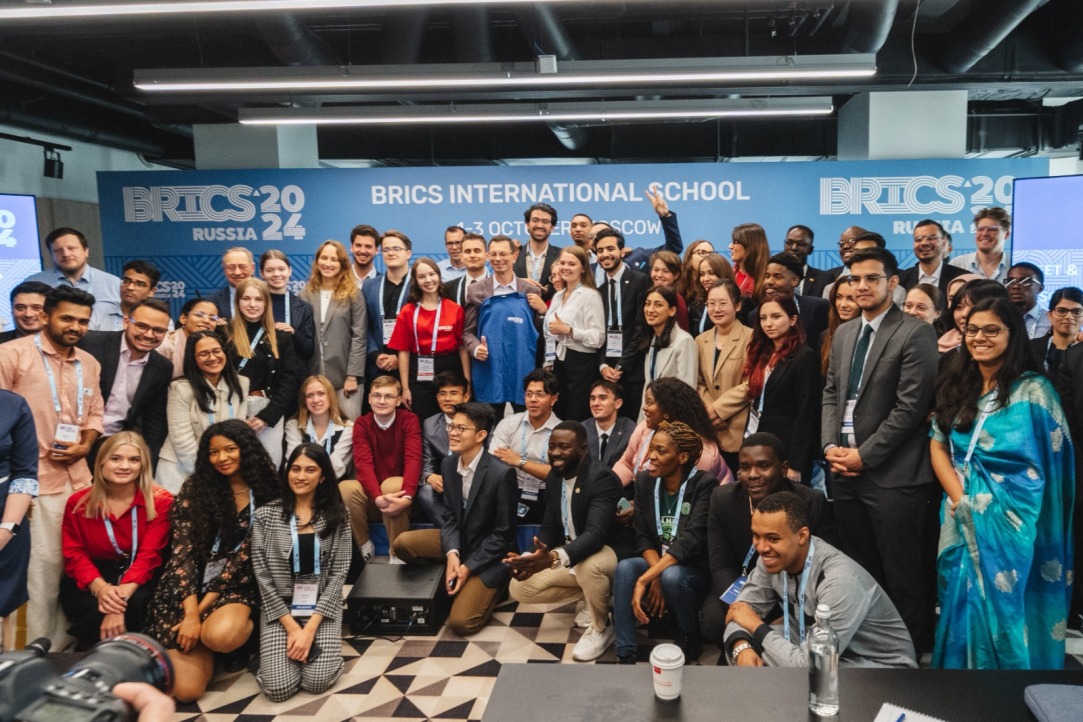HSE University to Host BRICS International School: New Generation

Registration for the BRICS International School: New Generation, one of the leading international educational projects aimed at prospective leaders interested in the agenda of global development and cooperation within the framework of BRICS, has opened.
This autumn, HSE University will host 100 prospective leaders participating in the BRICS International School: New Generation. The school is held annually with the support of the Russian Ministry of Foreign Affairs, while the BRICS Expert Council–Russia established at HSE University operates as its intellectual and organisational centre. HSE's participation in the project provides in-depth academic expertise, as well as systematic support for prospective BRICS experts.

Victoria Panova
The BRICS International School: New Generation is not limited to the educational format. It has become a platform for establishing a new, more just, and inclusive world order. Today, BRICS is not only an economic association, but above all, a vibrant community of people ready to interact on equal terms and learn from each other. That is why the formats that bring together young people, experts, and researchers have become so important. HSE University, as one of the leading research and educational platforms, plays a key role in this process: we not only support the project academically, but also support its development as an institute for international dialogue among a new generation. We are proud that the school has already become a point of attraction for young leaders from dozens of countries around the world and continues to develop as BRICS expands,’ said Victoria Panova, HSE University Vice Rector and Head of the BRICS Expert Council–Russia.
Following the expansion of the BRICS association in 2025, the project is entering a new stage of development. The school is focused on building a community of young leaders and promoting a positive BRICS agenda. It focuses on expanding the pool of experts capable of working in the field of global governance, international relations, economics, and humanitarian cooperation.
The project history dates back to 2017, when Russia began to conduct the first short-term educational programmes on cooperation between the BRICS countries for students and prospective scientists. Eight years later, the project has become a global movement that attracts participants from all over the world. School graduates become BRICS ambassadors and form a new global community.

Raymond Matlala
‘We need to remember that when we invest in the younger generation, we not just invest in the development of specific people—we invest in our future. As the saying goes, “less talk, more action.” And this is exactly what HSE University and the BRICS Expert Council–Russia do. I admire this approach, and I would like to encourage the leaders of other BRICS countries to invest more actively in young people,’ says Raymond Matlala, founder and chairman of the South African BRICS Youth Association, Chairman of Y20, participant of the BRICS International School 2017.
The intensive educational programme features lectures by leading Russian and international specialists, master classes, business games, debates, and expert discussions. The school provides an opportunity to thoroughly study the mechanisms of interaction between the BRICS countries, their positions in the system of international relations, their role in shaping the new world order and the prospects for the institutional development of the association.
Prospective scientists and innovators, diplomats, representatives of relevant ministries and departments, research centres and civil society, political scientists, entrepreneurs, international journalists, and leaders of youth movements aged 18 to 35 are invited to participate in the project. The organisers provide accommodation, meals, and transfers as part of the programme. Participants pay for travel to and from the school venue, as well as visa and medical insurance costs.
Applications are open until September 15.
The selection of participants is carried out on a competitive basis.
Dates: autumn 2025
Location: Moscow, Russia
Format: on-site
Language: English
More detailed information can be found on the project's website.
See also:
HSE University to Host Second ‘Genetics and the Heart’ Congress
HSE University, the National Research League of Cardiac Genetics, and the Central State Medical Academy of the Administrative Directorate of the President will hold the Second ‘Genetics and the Heart’ Congress with international participation. The event will take place on February 7–8, 2026, at the HSE University Cultural Centre.
HSE University Develops Tool for Assessing Text Complexity in Low-Resource Languages
Researchers at the HSE Centre for Language and Brain have developed a tool for assessing text complexity in low-resource languages. The first version supports several of Russia’s minority languages, including Adyghe, Bashkir, Buryat, Tatar, Ossetian, and Udmurt. This is the first tool of its kind designed specifically for these languages, taking into account their unique morphological and lexical features.
Language Mapping in the Operating Room: HSE Neurolinguists Assist Surgeons in Complex Brain Surgery
Researchers from the HSE Center for Language and Brain took part in brain surgery on a patient who had been seriously wounded in the SMO. A shell fragment approximately five centimetres long entered through the eye socket, penetrated the cranial cavity, and became lodged in the brain, piercing the temporal lobe responsible for language. Surgeons at the Burdenko Main Military Clinical Hospital removed the foreign object while the patient remained conscious. During the operation, neurolinguists conducted language tests to ensure that language function was preserved.
HSE Scientists Use MEG for Precise Language Mapping in the Brain
Scientists at the HSE Centre for Language and Brain have demonstrated a more accurate way to identify the boundaries of language regions in the brain. They used magnetoencephalography (MEG) together with a sentence-completion task, which activates language areas and reveals their functioning in real time. This approach can help clinicians plan surgeries more effectively and improve diagnostic accuracy in cases where fMRI is not the optimal method. The study has been published in the European Journal of Neuroscience.
Transition to Sustainable Development Requires Deep Structural Transformation of Business
A group of researchers has proposed assessing the ESG transformation of businesses through the partner turnover ratio in raw material and distribution supply chains. The researchers note that the path towards sustainability requires a deep and often costly restructuring of partner networks. This and other papers were presented at the Third International Annual Conference ‘ESG Corporate Dynamics: the Challenges for Emerging Capital Markets.’
HSE Researchers Offer Guidance to Prevent Undergraduate Burnout
Researchers at the HSE Institute of Education have identified how much time students should ideally devote to their studies, extracurricular activities, and personal life to maintain strong academic performance without compromising their mental health. An analysis of responses from 2,753 students, combined with their actual academic results, revealed several risk factors—such as excessive homework—as well as positive factors, including sufficient sleep, regular exercise, and moderate participation in projects. Based on these findings, the researchers developed practical recommendations for both students and universities. The paper has been published in the European Journal of Education.
HSE Scientists Contribute to Development of Postquantum Ring Signature for Sber
A new cryptographic data protection mechanism has been jointly proposed by experts from the HSE Tikhonov Moscow Institute of Electronics and Mathematics, Sber, and QApp. The researchers have developed a postquantum ring signature scheme that ensures anonymity (within a defined group of participants), as well as the integrity and authentication of the source of digital transactions, even in the presence of an adversary equipped with a quantum computer.
‘National Symbols of States Are an Integral Part of Cultural Code’
In December 2025, HSE University hosted the first Forum of the BRICS Law Schools Consortium organised by the HSE Faculty of Law. The forum brought together 42 international delegates (including 10 deans) from 14 universities in Belarus, China, South Africa, India, and Indonesia. The programme included expert discussions, the signing of cooperation agreements, and the adoption of decisions on the future areas of activity of the BRICS Law Schools Consortium, which was established at the initiative of the HSE Faculty of Law.
When a Virus Steps on a Mine: Ancient Mechanism of Infected Cell Self-Destruction Discovered
When a virus enters a cell, it disrupts the cell’s normal functions. It was previously believed that the cell's protective response to the virus triggered cellular self-destruction. However, a study involving bioinformatics researchers at HSE University has revealed a different mechanism: the cell does not react to the virus itself but to its own transcripts, which become abnormally long. The study has been published in Nature.
Researchers Identify Link between Bilingualism and Cognitive Efficiency
An international team of researchers, including scholars from HSE University, has discovered that knowledge of a foreign language can improve memory performance and increase automaticity when solving complex tasks. The higher a person’s language proficiency, the stronger the effect. The results have been published in the journal Brain and Cognition.


